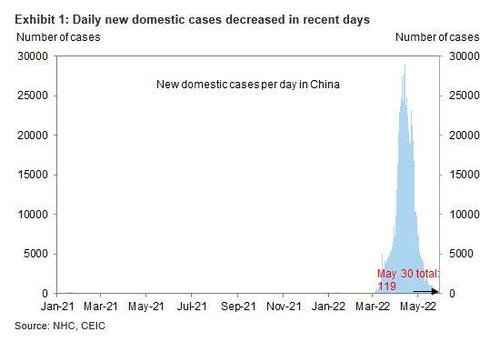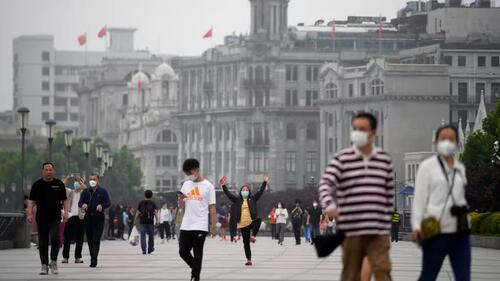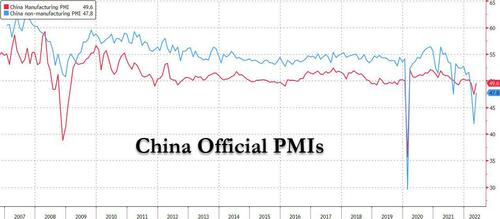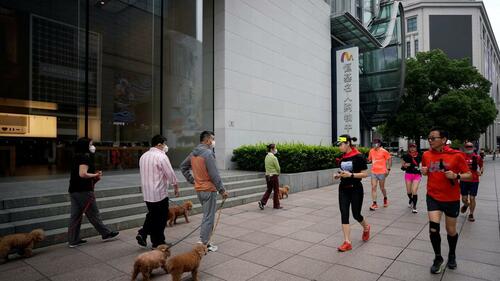“The Nightmare Has Ended”: Shanghai Reopens After Two-Month COVID Lockdown
Relieved residents danced in the streets after Shanghai on Wednesday officially lifted a two-month virus lockdown that triggered public outrage while dealing a huge blow to the economy, sending it reeling to depths not seen since the global shutdown in Q1 2020.
Dozens of cities across China have been under full or partial lockdown for months as the country with the “zero covid” policy battled its worst COVID-19 outbreak since early in the pandemic. But the Shanghai shutdown was the biggest, with most of the city’s 25 million residents confined to their homes since late March, turning the once-bustling metropolis into a ghost town.
That changed at midnight on Wednesday, when Shanghai authorities started taking down metal barriers and yellow plastic blockades that had blanketed one of the world’s biggest cities. Residents spilled into the streets to celebrate what was for many their first taste of freedom since the lockdown orders.
As the Nikkei reports, some residents cheered and posed for photos, others danced and drank in the streets until the early hours of Wednesday morning while parks filled up with kids and their parents. The end of the lockdown meant a green light for neighborhood businesses and major manufacturers to restart operations. But dining inside restaurants was still banned, bars are open but don’t serve alcohol, and movie theaters and gyms remain closed. Supermarkets, convenience stores and pharmacies were to reopen gradually with capacity limits.
Restarted public transit filled up with white-collar workers making their way back to the office. “I am glad the nightmare has ended,” said a banker surnamed Chen as he returned to work in the Lujiazui financial district. “But only about half of the staff will be back to the office this week due to COVID-prevention rules before we fully resume next week,” Chen said.
Chen was among hundreds of thousands of unlucky people hauled off to makeshift quarantine facilities after being suspected of coming into contact with a virus-infected person. He described his two-week stay at the bare-bones site as a “horrifying experience.”
Some more details from Nikkei:
Shanghai lifted the lockdown after confirmed infections this week plunged into the low double digits from highs topping 20,000 a day in April.
But the draconian measures sparked widespread anger as they left some homebound people jobless and others desperately struggling to keep businesses afloat. Food shortages and limited access to medical care aggravated the outrage, which often spilled on to social media despite government efforts to portray the shutdown as orderly and well managed.
The restrictions in Shanghai and other cities, including the capital Beijing, have taken a bite out of the economy and raised questions about whether China can hit its 5.5% growth target this year. There were signs, however, that factory activity was rebounding modestly as production shutdowns and other virus restrictions are eased.
To be sure, China is already “benefiting” from the reopening, with the latest PMI print seeing a bounce from recent lows. Expect these numbers to rise materially in coming months as more lockdowns ease.
On Wednesday, people walked their dogs on Shanghai’s streets and seniors practiced tai chi in public squares while barbers welcomed shaggy-haired residents in need of a trim. But the jubilation was mixed with caution, as many feared another outbreak could prompt nervous authorities to bring back restrictions.
“We feel happy, but at the same time we worry about another outbreak,” a husband and wife duo told Nikkei Asia as they walked along the Bund, Shanghai’s historic riverside district. “Many people think the pandemic is over … but it is clearly not.”
Some shopping malls threw open their doors Wednesday, while many retailers spent the day cleaning and disinfecting shops before welcoming back shoppers.
“Customers will likely to stay away for the first few weeks, just like what we went through in 2020,” said Jia Hong, a hot bun seller in the Jing’an central business district. “Many are wary about the risks of eating outside.”
China’s biggest lockdown tested President Xi Jinping’s signature zero-COVID policy, which relies on heavy restrictions, including mass testing and lockdowns, to quash outbreaks at any cost.
The government has said it is sticking with that approach in a bid to save lives and stop its health care system from being overwhelmed, even as much of the world moves toward living with the virus. That means Shanghai residents must now take a PCR test every three days at one of thousands of temporary screening booths in order to use public transit or enter shops.
“We will have to do this endlessly,” said Bai Ying, a property agent who was getting tested. “The risk of catching the virus is higher here than at home, but we have no choice.”
Tyler Durden
Wed, 06/01/2022 – 17:05
via ZeroHedge News https://ift.tt/G01FvhC Tyler Durden



